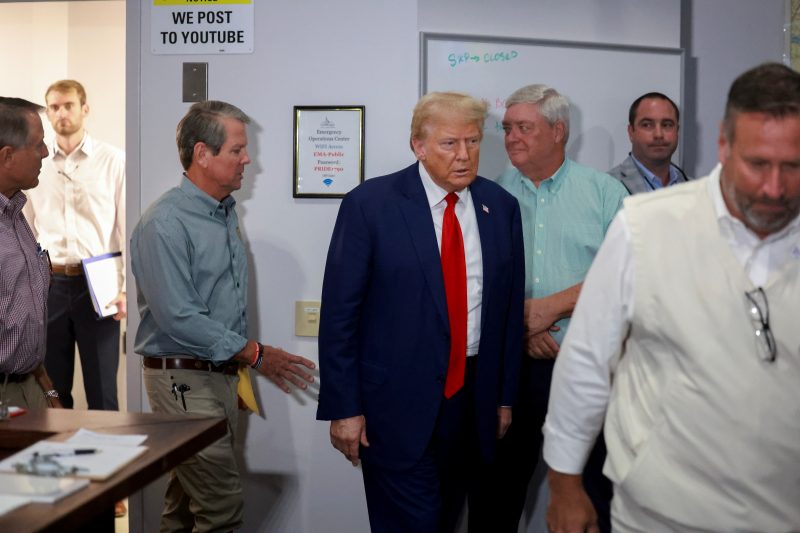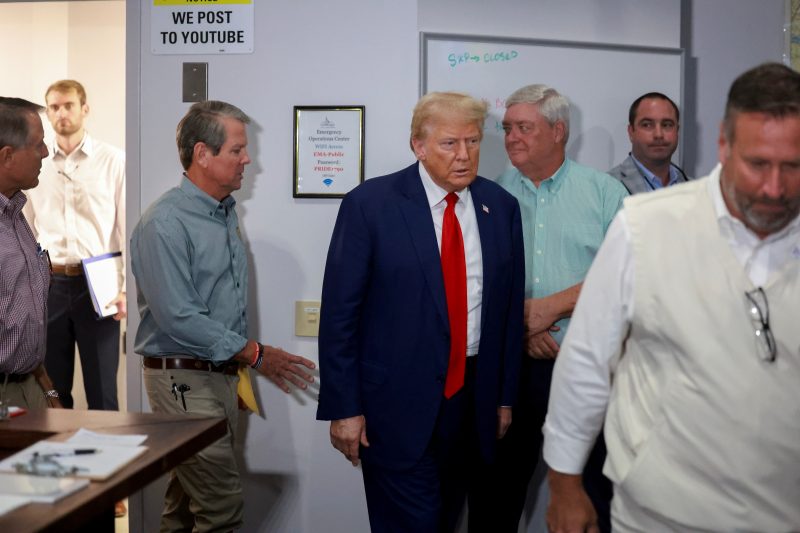
Donald Trump falsely claimed as president that “cleaning” forests would prevent California wildfires. He showed Americans a doctored hurricane map, altered with a Sharpie to bolster an inaccurate tweet about the storm’s path. He said the calculated death toll of Hurricane Maria had been inflated, which was untrue.
And in recent days, he has incorrectly said that the Biden administration can’t adequately respond to Hurricane Helene because it used its disaster funds for migrants.
In office and now as a candidate, Trump has repeatedly responded to natural disasters by peddling misinformation that can obscure the reality on the ground. In the final weeks of his presidential campaign, Trump is seeking a political edge against Vice President Kamala Harris by tying her to what he portrays, using misleading information, as a failed response to the destructive storm.
Disaster responses are often complex, costly and fraught with the potential for unpredictable challenges, but Trump’s claims have not focused on those issues. The effect of the storm on the presidential race is unclear, but Trump’s strategy has come sharply into focus over the past week.
While speaking in Florida on Monday, Trump said the response to the storms “has been very weak, unbelievably weak,” adding “nobody’s ever seen such a weak response.”
Trump and his allies have been comparing the storm to Hurricane Katrina in 2005, which was widely seen as a failure for the Bush administration. Voters in the states hit by Helene “will respond by VOTING FOR ‘TRUMP’” he wrote on social media Monday, falsely stating that the battleground state of North Carolina “HAS BEEN VIRTUALLY ABANDONED BY KAMALA!!!”
Alex Conant, a Republican strategist who worked in the Bush White House during Katrina, recalled a previous era when natural disasters weren’t as politicized — noting, for example, that New Jersey Republican Gov. Chris Christie warmly greeted President Barack Obama after Superstorm Sandy in 2o12.
“Historically, hurricanes are a time where politicians like to put partisanship aside and show they’re focused on the greater good,” he said. “Trump does not have that instinct at all and he’s so controversial that Democrats don’t have that instinct with him either.”
Over the years, Trump also has a record of taking steps that disaster victims have perceived as insensitive, such as tossing paper towels out to a crowd of Puerto Ricans or claiming that California firefighters weren’t properly battling wildfires.
When it comes to Helene’s aftermath, federal responders face logistical and terrain challenges, with damage spread across six states and a still-mounting death toll of at least 230. Some residents in more remote areas have said assistance was slow. And while FEMA has enough money for the immediate response, the agency needs more funding from lawmakers for long-term recovery efforts.
Trump, however, has incorrectly accused the White House, and Harris, of using $1 billion in FEMA aid for migrants — a claim a Washington Post fact check found is false. He also accused North Carolina officials of withholding aid from Republican areas, which the office of Democratic Gov. Roy Cooper called misinformation.
Amid his openly political jabs over the storm, at an event in Georgia on Friday, Trump told reporters he was focused on lives and not voters, adding, “We’re not focused on the election.” In response to a request for comment from the The Post, the Trump campaign on Monday called the federal government’s response “a disaster” and said the former president was highlighting residents’ concerns.
“If he were in office today, the federal government would be moving at a business speed, not a bureaucratic speed,” said Trump campaign spokesperson Karoline Leavitt.
W. Craig Fugate, who was FEMA administrator under Obama, said Trump’s remarks are “irrelevant” to most of the people on the ground, who have limited communication access. “It’s just noise and it doesn’t really help but it hasn’t done anything to change the response,” he said.
As for Trump’s record in office, he said: “There was a lot of noise in the system, I used to routinely get calls every time a certain individual tweeted, in most cases whatever the tweet was about, the federal agencies were doing what they were supposed to be doing.”
While the recovery from Hurricane Helene continues, another storm, Milton, is barreling toward Florida, where Trump lives. The former president has already postponed campaign events there that had been scheduled for Tuesday.
The Biden administration has sharply pushed back against Trump’s claims. Harris on Monday called the “disinformation being pushed out there” by Trump “extraordinarily irresponsible.”
Harris, like Trump, visited Georgia and North Carolina. The vice president reached out to Florida Gov. Ron DeSantis (R) last week to discuss the federal response to Helene and offer support, according to a senior administration official, who spoke on the condition of anonymity to relay private conversations. But DeSantis refused to take her call and did not appear with the President Joe Biden when he visited Florida last week.
DeSantis spoke with Biden on Monday evening about the recovery efforts for Helene and to prepare for Milton. DeSantis said on Fox News that Harris has “no role in this’ and accused her of “trying to politicize the storm.”
Harris also connected last week with Cooper and Georgia Gov. Brian Kemp, a Republican who supports Trump and has a complicated past with him. The senior official said Harris’s office reached out to Florida officials on Monday and will continue to in the coming days regarding Milton.
Tim Frazier, faculty director of the emergency and disaster management program at Georgetown University, said getting factual information to both people affected by disasters and those responding to them is a top priority in a high-stakes situation — something that can be hindered by politicization.
“Getting politics out of disasters and emergency management is really critical,” Frazier said. “It’s dangerous, it doesn’t help, and it certainly makes the job of our disaster responders, our first responders, more difficult.”
Last month, Trump threatened to withhold federal aid from California — whose governor, Democrat Gavin Newsom, is a bitter political rival — if elected in November unless the state doesn’t change how it manages water.
In 2017, the Trump administration moved faster to help hurricane victims in Texas than in Puerto Rico, a Politico investigation found. In 2018, Trump reportedly balked at approving disaster aid for blue California until he was told that Republican-leaning areas were affected. In 2020, when Michigan was enduring disastrous flooding, Trump threatened to withhold funding in the state because he was displeased with officials’ plan to send out absentee voting applications.
His administration withheld $20 billion in disaster recovery funds for Puerto Rico and blocked a federal investigation into why those funds had not been released, the Department of Housing and Urban Development’s inspector general found.
Trump has for years mischaracterized wildfires, claiming that California wasn’t using enough water to fight fires and incorrectly blaming forest management for wildfires. He has suggested fires could be prevented by raking forest floors, cast doubt on climate change science in one 2020 meeting with state officials, and suggested that California should wet its forests. All are claims that scientists say show a misunderstanding of how fires spread and are fought.
“You have all that water that could be used to … where the land would be damp and you’d stop many of these horrible fires,” Trump incorrectly said at a California news conference Sept. 13. He continued: “Gavin New-scum is going to sign those papers and if he doesn’t sign those papers, we won’t give him money to put out all his fires,” Trump said, using his epithet for Newsom.
Newsom afterward called Trump petty and self-serving. “Disasters don’t discriminate by political beliefs and his words should be a concern for all Californians,” the governor said in a statement. “As Americans, we rally together in a time of crisis but Trump only cares about himself.”
In 2019, Trump incorrectly warned Americans that Alabama was in the path of Hurricane Dorian — then, in a White House video, displayed a doctored hurricane map that had been altered with a marker to make the hurricane look like it was indeed headed to the state, though no threat to Alabama existed.
Trump doubled down on the claim in the following days on Twitter, forcing the National Weather Service to broadcast that Alabama would not be hit. The White House was later found by the Commerce Department inspector general to have pressured the National Oceanic and Atmospheric Administration to back Trump’s erroneous claims and disavow Weather Service meteorologists.
Yasmeen Abutaleb contributed to this report.

